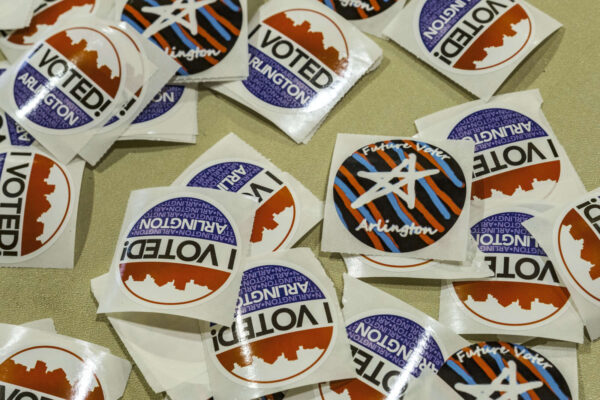
Once a week, we provide additional insight into local news stories for ARLnow Press Club members with our Reporter’s Notepad feature. Here’s one we published earlier this week.
I had a long chat with Arlington GOP Communications Director and former ARLnow opinion columnist Matthew Hurtt about Tuesday‘s election results and what the slight shift to the right here (which went 17% for Donald Trump in 2020 and 22.8% for Glenn Youngkin on Tuesday) means for the future of the local Republican party.
Hurtt attributed Youngkin’s victory to the governor-elect taking up education as a major campaign focus in a year when many parents were frustrated with school closures and masking policies, how schools talk about systemic racism, and policy decisions such as changing the admissions standards at Thomas Jefferson High School for Science and Technology in Fairfax County or eliminating all advanced math classes before 11th grade.
He says the energy that brought those folks out — contributing to a higher level of Republican enthusiasm in Arlington than he had seen in years — can propel a greater county-level Republican presence in local offices.
But it’s a steep road to climb in Arlington: The last time a non-Democrat sat on the County Board, for example, was when John Vihstadt won in 2014. The last non-Democrat on the Board before Vihstadt was 15 years prior.
And even though qualified Republican candidates are out there, Hurtt says, they have public-facing jobs and tend to view the (R) by their name as a liability in a county that went 80% for President Joe Biden.
The non-establishment types who do mount campaigns run as independents, providing occasional counterpoint to establishment Democrats but never building enough of a coalition to win an election. This year, incumbent Democrat Takis Karantonis claimed 60% of votes and beat out his three independent opponents.
Hurtt said he appreciated every independent’s qualifications: as a perennial candidate, Audrey Clement knows the history of important issues; Mike Cantwell got his start with a Yorktown parents group and the Yorktown Civic Association; and Adam Theo had experience in organizing the local Libertarian party.
“How do we make a mega-candidate out of those people? You’re not going to win in Arlington without Democrat votes, so he or she needs appeal,” he said. “It needs to be somebody who can speak to Republicans and Democrats.”
The hypothetical Theo-Cantwell-Clement super candidate chipped away roughly 40% of the vote. But unfortunately, Hurtt said, the reality in Arlington is that they didn’t stand a chance, as Democrats “are a Tammany Hall machine” (referencing a group of Democratic political bosses who, for 200 years, controlled New York City politics).
“They’ve professionalized their activism,” he said. “I give them kudos for doing it: it prevents anyone — even within Democrat ranks — from dissenting.”
Nowhere was that more apparent, he observed, than when Miranda Turner ran against Mary Kadera during Arlington County Democratic Committee’s School Board caucus, which endorsed Kadera to replace Monique O’Grady.
Turner’s candidacy, tailored to the issues of reopening schools, represented the body of parents who were dissatisfied with how the School Board and Arlington Public Schools handled school closures — one reason Hurtt said education-issues voters went for Youngkin — but whose political views were diverse. (One caveat is that while the group members are bipartisan, at least in the case of the neighboring Fairfax group, funding seems to come from right and center-right people and groups.)
That could be why the anti-Trump messaging from Terry McAuliffe’s campaign, coming from McAuliffe and President Joe Biden during their joint events in Arlington, wasn’t enough to secure his victory. There was a cohort of voters for whom that label didn’t ring true.
We know that this election brought out the suburban Republicans who didn’t support Trump in 2020, per the University of Virginia’s Center for Politics. We also know that Youngkin kept some distance between himself and Trump, except when he discussed election integrity and audits of voting machines.
“It didn’t appear as though Youngkin did engage with Trump,” Hurtt said. “I didn’t hear much about Trump in Arlington. The voters were more interested in what he was going to do as governor, and they were not particularly interested in who was president last year.”
Unfortunately, he says, local GOPers are often too focused on federal politics. To get that “mega-candidate” he spoke of in 2022 or 2023, he said Arlington GOP’s game plan is to hammer home the importance of getting involved in civic associations — the bedrock of local engagement in the county.
“That’s our next move,” Hurtt said. “We want Republicans to be part of their civic associations, the local machinations that are largely non-partisan, the Arlington Committee of 100, the Columbia Pike Partnership [formerly the Columbia Pike Revitalization Organization], the Rosslyn Business Improvement District… We want them to show up and show people that Republicans are engaged in the community.”

